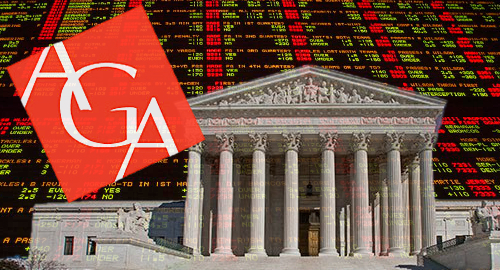 The American Gaming Association (AGA) has added its weight to New Jersey’s fight to have its sports betting appeal heard by the US Supreme Court.
The American Gaming Association (AGA) has added its weight to New Jersey’s fight to have its sports betting appeal heard by the US Supreme Court.
Recent years have seen the AGA adopt a more activist stance towards overturning the federal PASPA sports betting prohibition. On Wednesday, the AGA filed an amicus brief detailing its belief that the “failed” prohibition “presents fundamental questions about states’ sovereignty to define their own laws and combat crime within their borders.”
Without getting too deep into the weeds, the AGA’s brief echoes the other amicus briefs filed in this case by citing the standard refrain that PASPA is unconstitutional for commandeering the states’ authority, while adding that a growing body of US citizens now favor legal sports betting.
COULD TRUMP MAKE AMERICA BET AGAIN?
The fact that America just elected its first president with a resume that includes running casinos – running them into the ground, but who’s counting – adds a potential wild card into the legal calculation. While the Court is expected to announce whether or not it will hear New Jersey’s appeal – and the sharp money is on ‘not’ – before Der Donald takes his oath of office, Trump could nonetheless have great influence over what happens next.
Back when Trump still had casino interests in Atlantic City, he pressed New Jersey to take advantage of PASPA’s grandfathering clause by legalizing sports betting, primarily so the state could keep his taxes low. Sadly, state legislators dawdled, and the window closed without taking any action.
Becker & Poliakoff attorney Daniel Wallach, who specializes in gaming law, wrote a blog post last week suggesting that even if the Court refuses to hear New Jersey’s case, Trump could appoint an attorney general who simply chooses not to enforce PASPA, thereby leaving the decision on whether to allow sports betting up to the individual states.
Sports leagues would still be able to legally prevent states from offering wagers on their contests, but states could play an incremental game of divide and conquer by convincing individual leagues to allow wagering on their contests, over which the other leagues would be powerless to intervene.
This gambit might not attract the big four (NFL, NBA, MLB and NHL), but Wallach suggests smaller US sports bodies – soccer, golf, MMA, NASCAR, etc. – might find benefits in such a scheme. Then again, NBA commissioner Adam Silver has publicly advocated for legal sports betting, and such a scheme would give him a chance to finally back up his rhetoric with concrete action.





